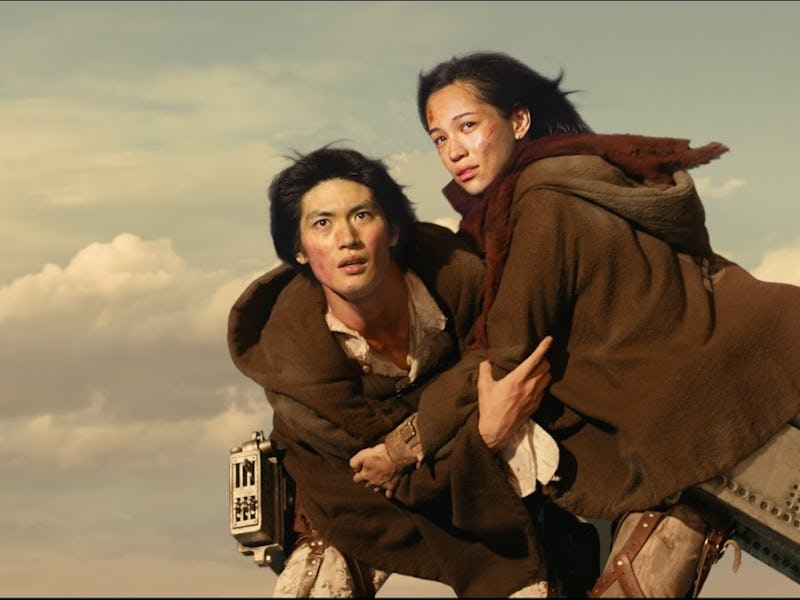5 Concepts America's 'Attack on Titan' Movie Could Improve
Warner Bros was eyeing an American 'Attack on Titan' back in January.

Attack on Titan, despite international acclaim and popularity, hasn’t fully made the jump to an American audience. In January, Warner Bros. bought the rights to an English-language Attack on Titan movie, though no developments have been announced since. Whether it’s Warner Bros. or another studio, however, it’s only a matter of time before the humanoid kaiju stomp their way into American theaters. Before that happens, we need to get a few things straight.
Hajime Isayama’s manga, which the author began as a one-shot comic in 2006, has sold over 63 million copies as of March 2017. The anime series began in 2013, and in 2014, the audio was dubbed in English and released in North America. Season 2 of the Japanese anime began simulcasting in Japan and America this month, making the case for a rabid American audience.
The property, like other recent Japanese anime based on manga, comes with many cultural references that Americans won’t understand immediately. For instance, though it’s set in an imaginary city, the characters have mostly German names, except for Mikasa. In the manga, she is the last surviving person of Asian descent on Earth. Some of the story’s plotlines — including the monarchy, militarization of youth, and the fact that protagonists Eren and Mikasa never get together — are specifically informed by Japanese storytelling.
Aside from avoiding a whitewashing controversy, there are several other things an American Attack on Titan film needs to keep in mind. We’ve compiled them here:
Color Correction
One of the most disturbing aspects of the Attack on Titan anime is that all the bloodshed happens under gorgeous, wide-open skies. When the Survey Corps moves outside the city to attack Titans in the wild, they’re horrifically tortured and killed in a peaceful-looking forest, one that could easily be switched in as the backdrop in a Miyazaki movie. The dissonance between the anime’s soft-looking natural environment and the Titans eating people alive is part of what makes the horror really ring through your guts. Take a look at what the Japanese feature film did to the backdrop — spoiler alert, it looks a lot like Batman v Superman.
Scary, but also somehow numbing.
Even in the Japanese film’s opening sequences, we can see the irony of Attack on Titan’s natural wonder is lost.
A Pop-Punk Soundtrack
Attack on Titan, like many anime of the late 2000s, features a rollicking, militaristic pop-punk opening song. Though the music played during the show’s drama is instrumental and emotional, part of the Attack on Titan tradition is sticking loud, thrilling teen-friendly songs at the beginning and end of each episode.
After all, though it’s an emotional story, Attack on Titan is essentially a story about teenage soldiers forced to fight because of decisions adults made long, long ago. It’s a story about angst, and a soundtrack that sounds like 2000s-era My Chemical Romance will communicate that. Version two of the anime’s opening songs sounds a whole lot like “Welcome to the Black Parade.”
The Military Police Brigade Aren’t Nazis
The Japanese live-action film costumed the Military Police Brigade, who make the hardest choices in the anime, as if they were SS officers. The change was confusing even to audiences unfamiliar with the source material because it introduced a cultural reference to the story without bothering to explain it. Why, one might ask, is the Survey Corps following a group of Nazi soldiers, and why are they never overtaken? Are they supposed to be villains?
Mikasa Isn’t a Wuss
Toho made a grave mistake in changing Mikasa’s personality for the film. In the manga and anime, Mikasa Ackerman is deadly and flinty, and she has the most Titan kills of the entire teenage army. As creator Hajime Isayama once said, she’s a character who’s supposed to thrill the viewer as she grows into herself as both a warrior and an adult, and any romance with Eren or another character would be an insult.
Those who made the two-part Japanese film heard that explanation and replied, “Yeah, okay, but what if she whined all the time and flirted with both Eren and Armin?”
For God’s Sake, Give Us Levi
Not adapting Captain Levi into the feature film as a badass was one of the Japanese film’s chief errors. In addition to acting out some of the show’s most exciting fight scenes, Levi gives the viewer a look at what happens to a young man who’s been raised more so as a soldier than a teenager. Eren, our protagonist, is fiery and passionate, but Levi has cooled on his own skills, and that’s wonderfully disturbing.
Season 2 of Attack on Titan is available to stream on Funimation.